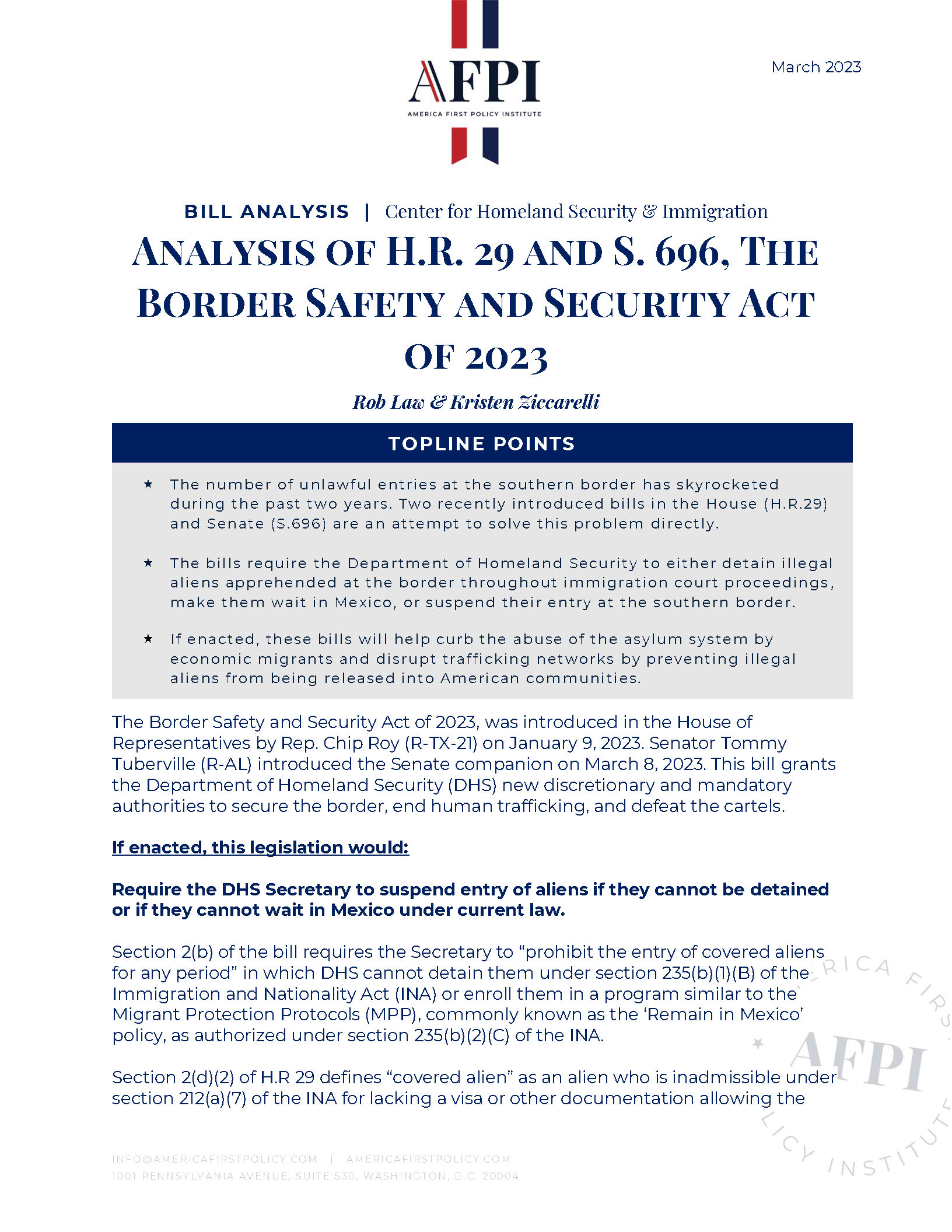Analysis of H.R. 29, the Border Safety and Security Act of 2023
Key Takeaways
The number of unlawful entries at the southern border has skyrocketed during the past two years. Two recently introduced bills in the House (H.R.29) and Senate (S.696) are an attempt to solve this problem directly.
The bills require the Department of Homeland Security to either detain illegal aliens apprehended at the border throughout immigration court proceedings, make them wait in Mexico, or suspend their entry at the southern border.
If enacted, these bills will help curb the abuse of the asylum system by economic migrants and disrupt trafficking networks by preventing illegal aliens from being released into American communities.
The Border Safety and Security Act of 2023, was introduced in the House of Representatives by Rep. Chip Roy (R-TX-21) on January 9, 2023. Senator Tommy Tuberville (R-AL) introduced the Senate companion on March 8, 2023. This bill grants the Department of Homeland Security (DHS) new discretionary and mandatory authorities to secure the border, end human trafficking, and defeat the cartels.
If enacted, this legislation would:
Require the DHS Secretary to suspend entry of aliens if they cannot be detained or if they cannot wait in Mexico under current law.
Section 2(b) of the bill requires the Secretary to “prohibit the entry of covered aliens for any period” in which DHS cannot detain them under section 235(b)(1)(B) of the Immigration and Nationality Act (INA) or enroll them in a program similar to the Migrant Protection Protocols (MPP), commonly known as the ‘Remain in Mexico’ policy, as authorized under section 235(b)(2)(C) of the INA.
Section 2(d)(2) of H.R 29 defines “covered alien” as an alien who is inadmissible under section 212(a)(7) of the INA for lacking a visa or other documentation allowing the alien into the country. The definition of “covered alien” in S.696 is broader and also includes an alien who is inadmissible under section 212(a)(6) of the INA for lacking a visa, other documentation allowing the alien into the country, or a nonimmigrant lacking required documentation.
Why this provision is necessary
Section 235(b)(1)(B)(IV) mandates the detention of any alien subject to expedited removal who tries to avoid deportation by making an asylum claim. If DHS is unable to detain these aliens, section 235(b)(2)(C) of the INA gives the Secretary the discretionary authority to return aliens to a contiguous country (Mexico or Canada) pending removal proceedings under section 240 of the INA.
While no administration has detained all illegal aliens subject to expedited removal, the Trump Administration used the discretionary authority from INA section 235(b)(2)(C) to implement the Remain in Mexico Policy. The Biden Administration’s decision to end Remain in Mexico and failure to implement a border security strategy has created a historic humanitarian crisis at the southern border.
The expulsion authority in this bill is modeled after the public health authority found in Title 42 of the U.S. Code, which the Trump Administration implemented at the beginning of the COVID-19 pandemic. The Title 42 authority was always intended to be temporary, so these bills grant similar authority to the DHS Secretary specifically for border security.
Empower States to Hold DHS Accountable for Failing to Comply
Section 2(c) of the bill authorizes the state attorney general or other state officer who alleges that DHS is violating the required detention or suspension of illegal alien entry that affects their state’s residents to “bring an action against the Secretary of Homeland Security” in U.S. district court.
Why this provision is necessary
Granting state attorneys general new enforcement authority empowers them to hold the federal government accountable for failing to enforce the law. Every state is negatively impacted by the humanitarian border crisis, so giving states the ability to protect their citizens is an important new enforcement tool that can be used to keep American communities safe and secure the southern border.
Allow the DHS Secretary to suspend entry of illegal aliens at U.S. borders to achieve “operational control” over the border.
Section 2(a) of the bill gives the Secretary the discretionary authority to suspend the entry of “covered aliens” at the border in order to achieve “operational control” of the southern border.
Why this provision is necessary
The Secure Fence Act of 2006 (Public Law 109-367) defines “operational control” as the “prevention of all unlawful entries into the United States, including entries by terrorists, other unlawful aliens, instruments of terrorism, narcotics, and other contraband.”
This legislation would grant DHS border expulsion authority similar to what is authorized under Title 42 for public health emergency reasons. The Trump Administration used Title 42 at the onset of the COVID-19 pandemic, but its application was intended to be temporary. Additionally, Title 42’s authority is based on public health grounds and was not intended to be a border security mechanism. Overall, this provision is needed to grant DHS the authority to expel aliens apprehended at the southern border immediately. This new authority would be a highly effective tool to secure the border, end human trafficking, and defeat the cartels.
